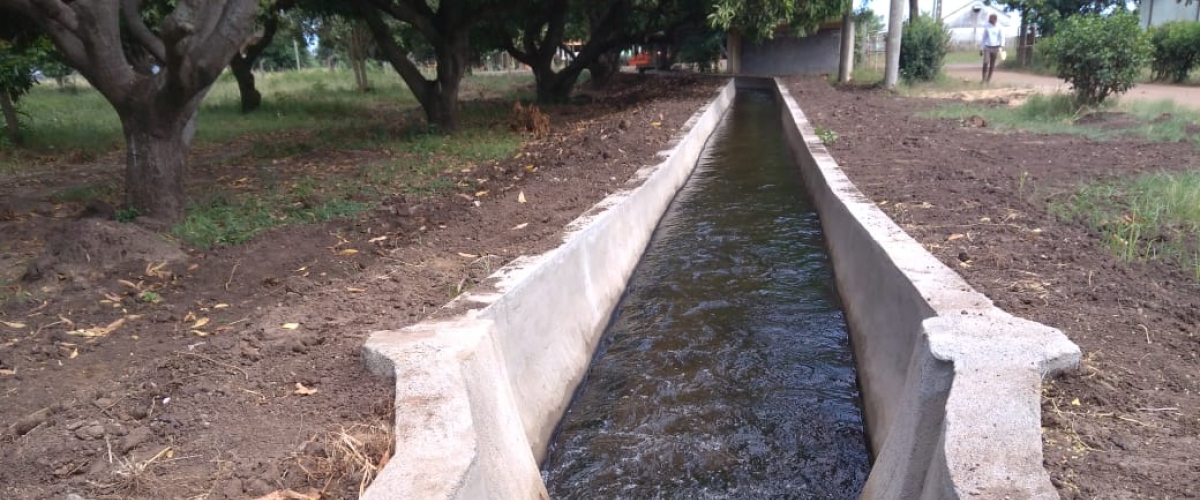
Unlike in the past, nowadays it is easier and more effective to conduct research under irrigation at Umbelúzi Research Station, located about 35km kilometers from Maputo, the capital city of Mozambique due to the rehabilitation of the irrigation scheme by the Agricultural Productivity Programme for Southern Africa (APPSA) coordinated by the Centre for Coordination of Agricultural Research and Development in Southern Africa (CCARDESA).
According to Mr Atumane Nuro, Agronomist and the head of this experimental unit, this is by far the most instrumental investment in the unit given that several trials both from the Agricultural Research Institute of Mozambique (IIAM) and CGIARs are conducted in Umbelúzi Research Station fields and most of them demand effective irrigation facilities.
“In the past, research under irrigation was very difficult due to water loss along the canal affecting significantly our trials and, note that most of trials in our research station are to benefit Mozambique as well as the region through CGIARs”, said Mr. Nuro.
In Mozambique, APPSA (a World Bank-funded initiative), supported the rehabilitation of three (3) irrigation systems covering about 100 hectares at Ribáuè Research Station (in Nampula Province), at Chókwè Research Station (Gaza Province) and Umbelúzi Research Station (Maputo Province).
Umbelúzi Research Station has been running trials since 1909 and accommodate trials for fruits, vegetables, pulses, maize, rice, Irish/sweet potato, cassava, and many other crops.
“Our research station is an advanced unit from which different stakeholders can have a holistic view of the Mozambican agronomic research focus, which can also be effective in surrounding countries, at least those sharing the same agroecological characteristics”, added Mr. Nuro.
CGIARs such as IRRI, CIMMYT, CIP, CIAT and others conduct joint trials with Mozambique scientists at the station which resultin the release of different varieties of rice, maize, orange-flesh sweet potato, legumes and many others.
“Today we are proudly recognized as part of the source of a handful number of new varieties released in Mozambique given that most of the trials are hosted in our unit and, the improved irrigation scheme has definitely placed us in a better position to effectively respond to our country research agenda and beyond”, ended Mr. Nuro.
Note that APPSA support covered the strengthening of the entire irrigation system which also included the setting up of sprinkles in about 16 hectares for research trials as well as for seed multiplication of the newly released varieties.
APPSA also supported the improvement of irrigation infrastructures in other RCoLs
Mozambique is the Regional Centre of Leadership (RCoL) on rice mandated to lead research efforts to benefit SADC through collaborative research and partnerships in the region. On the other end, Malawi and Zambia are also RCoLs, expected to lead the regional research agenda on their commodities of interest, namely maize and legumes, respectively.
Constructions and rehabilitations of research infrastructures were to contribute to fast-tracking the release of improved technologies in the region.
In Malawi, APPSA enhanced irrigation facilities at Bvumbwe and Kasinthula Research stations whereas, in Zambia, the beneficiaries were irrigation schemes from Msekera, Mount Makulu and Kabwe Research Stations.
Constructions and/or rehabilitations supported by APPSA both in Malawi, Mozambique and Zambia included acquisition and installation of 270 cubic meters/hour water pumps, transformation points installation (250 KVA and 100/110 KVA), construction of new pump stations with control board including water reservoirs (5 million liters storage capacity) which is enough to supply research fields for 2 weeks continuously.






